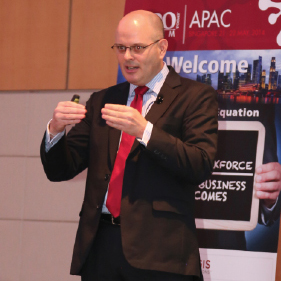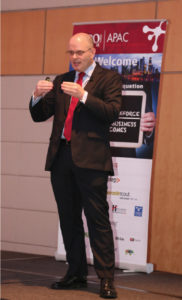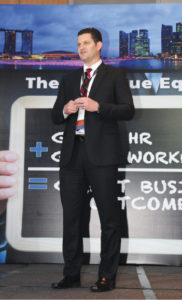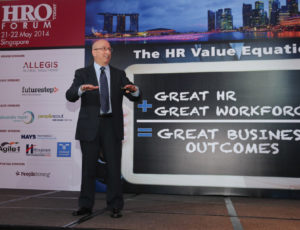
The HRO Today Forum returned to Singapore from 21 – 22 May gathering together HR practitioners and industry experts to tackle the great ‘HR Value Equation’ and help organisations achieve better business outcomes. We share advice gleaned from the senior HR teams in JP Morgan, Tyco and McDonalds.
Improvise, adapt & overcome
“Be brave when things go wrong, if it isn’t working don’t just flog it to death”, was the advice from Julian Bryant, APAC Head of HR Service Delivery, JP Morgan. On what HR can do to ensure successful HR service delivery, Bryant pointed out that risk management is not solely an HR responsibility and often no even an objective for them. Risk is, instead, inherent in all aspects of business and when plans do not go as expected, taking a step back and re-evaluating the best solution is the right path to take. Being flexible to change and ready to adapt to unforeseen challenges is important for business success. Alluding to his military background, Bryant reminded HR, “No plan survives the contact with the enemy, during operations they will be modified by the environment and people delivering it. You must learn to improvise, adapt and overcome.”
To minimise risk, however, Bryant advised organisations to ensure they have a comprehensive control framework and strong governance model. He urged HR. “You should be more like Starbucks—ensure a level of standardisation across all aspects of the business so employees know where they are and the expectations of the business.” He added, “Clear vision and values, standard processes, products and services and robust infrastructures—as well as defined and measurable metrics—are vital components to an operating model to ensure successful HR service delivery.”
Big data scary
He also stressed the importance of data and advised that defining your products and service catalogue is fundamental to the success of the business. He warned that big data is often overwhelming, but that no data at all frightens the heck out of people. As such he urged companies to be confident in knowing and explaining what they offer as well as the relationship with the market. He said, “You need to understand time to market, and make sure everyone is on the same page. Time kills deals. You need to know whether your solution is suitable for the market and be confident in its capabilities which should be priced accordingly.”
Bryant highlighted the need for HR to set clear expectations and to ensure that HRO vendors know the key objectives of each project, how these align with the business strategy and what they are expected to deliver. He also stressed the need to pay vendors competitively, warning, “If the vendors aren’t making money, they’re not going to be incentivised, this will reflect in the quality of people provided for a project, the time taken to roll-out new schemes and the number of mistakes being made.” On selecting suitable vendors he advised, “Never underestimate the value of going to visit vendors on site, and aside from simply talking to the sales team and operational managers, also sit down and talk to the rest of the staff—you get a great idea of how engaged they are—and therefore how likely the vendor would be in achieving the shared goals.”
Jerod Funke, Head Global Talent Acquisition, Tyco shed light on the company’s framework, which was specifically designed by its CEO George Oliver to accelerate business growth, driving operational improvement and building a performance culture.
Bringing its core values of integrity, excellence, teamwork & accountability to life, the organisation takes an enterprise approach to talent management, with a clearly defined leadership competency model maintained at all levels within the company.
With rapid expansion in emerging markets driving change, the company was urged to take measures to rebuild its business in China, which required a new approach and infrastructure and the need to develop a leadership potential and pipeline. The expansion was lead by Larry Global, the CHRO who Funke described as ‘easily the most strategic guy in the whole company’. The resultant HR transformation involved rethinking the organisation’s approach to recruiting talent, a duty that had previously proven to be a heavy burden for the HR Department and business partners who were solely responsible for hiring.
Until then, the agency’s hiring process had been very reactive due to the high volume of recruitment needs and a high turnover rate. Recognising the need for action to be taken, HR made the decision to implement a global partnership model to address the problem, setting up an RPO which aimed to focus on processes and how they needed to be modified in order to enhance efficiency and shorten cycle times.
As a result, the times taken to hire was reduced from 90 days to 50 days and whereas the organisation initially had to source 100 candidates to hire one, it now only needed to source 36 candidates to get one successful hire. The new recruitment process also lead to the decline of the hire turnover rate, which fell to only 10%.
The company now takes a proactive, rather than reactive, approach to hiring, using job boards and using access to source tracking data. It has also developed a creative concept called ‘The Passion that unites us’, which is an internal communication toolkit and external careers site that potential candidates can visit in order to view vignettes of current staff to get an idea of the culture of the company as well as viewing postings currently available.
Make it a double
Barry Mehrman, Senior Director, Human Resources, McDonald’s Asia Pacific, Middle East & Africa (APMEA) started with a quote from the organisation’s founder explaining, “We’re not just a hamburger company serving people. We are a people company serving hamburgers.” This was the foundation of Mehrman’s presentation, which shed light on McDonald’s vision to double its market share in APMEA by the year 2020. This would bring the hamburger giant to 7 million customers served by one million employees.
Get ready for 45 million interviews
With 10,000 restaurants in 38 countries and 450,000 staff in APMEA, the company goal to double its business through its people will create the need to interview 45 million applicants to find 550,000 new hires. With this in mind, the organisation implemented a people strategy designed to make sure the right people are in the right positions, continue to engage and energise, accelerate the talent pipeline at the frontline and on a country leadership level to help drive strategy, and devise new ways of collecting data through people analytics.
One of the key objectives—staffing for growth—involved the concept of BHOT: Benefits, Hiring, Orientation & Training. And this meant using some innovative hiring strategies including McDonald’s China 520 hiring week, Moms Career Day in Korea and WeChat broadcasts. Country managers were also hired via MBA Internships, LinkedIn subscriptions and corporate pages.
Energy boost
As part of the challenge to energise staff, crew and managers were asked what they liked best and least. This helped create EVP as a global concept, with ‘friends & family’, ‘flexibility’ and ‘future’ emerging as the top responses. The APMEA Ray Kroc Award also rewarded the top 1% of managers in the region, while the Olympic Champion Crew allowed some staff the chance to go and stay at the Olympic Games for a week, while they were feeding the hungry crowds.
Recognising the importance of pipelining future talent, McDonald’s also implemented talent management pillars, designed to enhance talent management capabilities at market level. Through this mechanism all managers identified HiPos and helped to come up with development plans for them. Metrics were used to identify gaps in terms of eight core leadership competencies and strategic workforce planning was put in place to develop staff in the restaurant development sphere. And with 7 million customers to serve—the ability to build and run all the new restaurants will be no mean feat.







